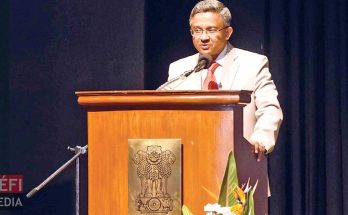 Taking a long-range view, the foreign ministers of India and Nepal have held wide-ranging talks and explored a host of ideas, including the signing of an extradition treaty, a hydropower deal, fast-tracking infrastructure projects and setting up of an eminent person group, to galvanise their multi-layered relationship.
Taking a long-range view, the foreign ministers of India and Nepal have held wide-ranging talks and explored a host of ideas, including the signing of an extradition treaty, a hydropower deal, fast-tracking infrastructure projects and setting up of an eminent person group, to galvanise their multi-layered relationship.
India’s External Affairs Minister Sushma Swaraj arrived in Kathmandu on July 25 for her first visit to the Himalayan nation. At the beginning of her three-day visit, she underlined that Nepal ranked high on the India’s priority list. Speaking to the media in Hindi at Kathmandu’s Tribhuvan International Airport, Swaraj said, “My visit is taking place within two months after I assumed office as external affairs minister. This is a testimony, how important Nepal is to India.” she said.
On July 26, Swaraj, along with her Nepalese counterpart Mahendra Pandey, co-chaired a meeting of the India-Nepal Joint Commission, which has been revived after a gap of 23 years. The two sides discussed a gamut of issues, divided into five clusters: political; security and border issues; economic co-operation and infrastructure; trade and transit; power and water resources; and culture, education and media.
The talks focused on firming up the agenda for the two-day trip by India’s Prime Minister Narendra Modi, the first bilateral visit by an Indian prime minster in over 17 years.
“India and Nepal discuss establishment of Eminent Person Group to look into potential of growth in bilateral relations,” tweeted Syed Akbaruddin, spokesperson for India’s external ministry.
The joint commission is mandated to review, assess and evaluate past agreements, project performance and the jobs carried out by the 32 mechanisms established at various levels between the two countries. The meeting is expected to seek a way to streamline the channels and provide an impetus to bilateral ties.
“The meeting I have come here to attend is taking place after 23 years. This has fallen under high priority of India. I have come to Nepal with a high hope that the relations between Nepal and India will be further strengthened and get further closer,” Swaraj said before the meeting.
Mahendra Pandey also expressed his desire to see the concerns of both countries being addressed to enhance understanding between the two countries. “The JC meeting will focus on completing the projects agreed earlier with India, remove misunderstandings that exist between the two countries and settle irritating factors seen in the relations between the two countries.”
One of the key issues that Swaraj is expected to bring up is the delay in signing an extradition treaty that allows the extradition of third country nationals between India and Nepal.
India and Nepal had signed an extradition treaty in 1953, but that treaty does not include extradition third country nationals. India has been pushing for such an extradition treaty especially as the porous border between the two countries has witnessed an increase in terrorist activities, and smuggling of fake currency. Nepal, however, has been reluctant to sign such a treaty given the political instability and the lack of political consensus on such a sensitive issue.
Author Profile
- India Writes Network (www.indiawrites.org) is an emerging think tank and a media-publishing company focused on international affairs & the India Story. Centre for Global India Insights is the research arm of India Writes Network. To subscribe to India and the World, write to editor@indiawrites.org. A venture of TGII Media Private Limited, a leading media, publishing and consultancy company, IWN has carved a niche for balanced and exhaustive reporting and analysis of international affairs. Eminent personalities, politicians, diplomats, authors, strategy gurus and news-makers have contributed to India Writes Network, as also “India and the World,” a magazine focused on global affairs.
Latest entries
 DiplomacyApril 10, 2024Diplomat-author Lakshmi Puri pitches for women power at LSR
DiplomacyApril 10, 2024Diplomat-author Lakshmi Puri pitches for women power at LSR India and the WorldApril 6, 2024UN envoy pitches to take India’s solutions to the world stage
India and the WorldApril 6, 2024UN envoy pitches to take India’s solutions to the world stage CultureApril 5, 2024Youth in Diplomacy: Making it Matter with LSR Model UN 2024
CultureApril 5, 2024Youth in Diplomacy: Making it Matter with LSR Model UN 2024 India and the WorldMarch 28, 2024India to China: Normalization of troops deployment imperative for restoring ties
India and the WorldMarch 28, 2024India to China: Normalization of troops deployment imperative for restoring ties







